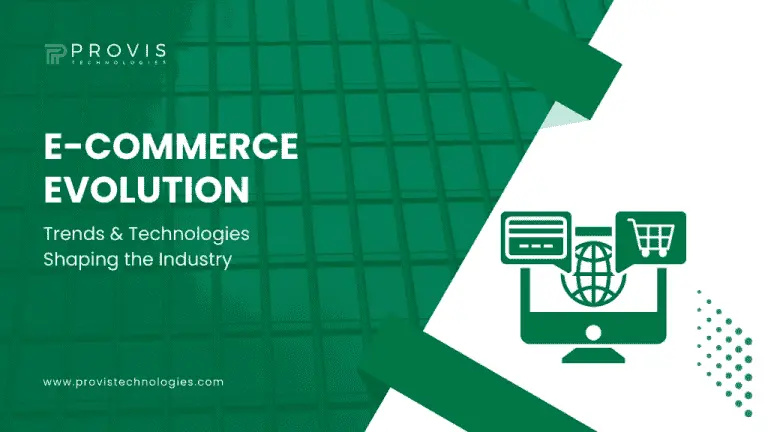E-commerce has been marked by significant changes in trends & technologies over the years. From the early days of online shopping to the present era of smooth transactions & personalized experiences, modern-day online shopping has become the epicenter of transformation. Let’s dwell in the dynamic world of e-commerce evolution, exploring the trends & technologies that are shaping the industry today.
Trends & Technologies Shaping the Industry

The Rise of Mobile Commerce
With smartphones becoming the norm, mobile commerce has emerged as a dominant force in e-commerce. Consumers now expect seamless shopping experiences across multiple devices, pushing businesses to optimize their platforms for mobile compatibility. Responsive design, mobile apps, and mobile payment solutions have become essential tools for capturing the growing segment of mobile shoppers.
Read More: Color Palette Generators for Website
Personalization & Customer Experience
In the age of information overload, personalized shopping experiences have become a key differentiator for e-commerce businesses. Data analytics & AI/ML technologies help analyze customer behavior to deliver tailored product recommendations, customized promotions, and individualized content. By enhancing the customer journey with personalized touchpoints, businesses can cultivate stronger relationships, drive engagement, and increase sales.
Read More: Why is 2024 a Great Year to Start Your E-commerce?
The Influence of Social Commerce
Today, social media platforms are more than communication tools – they have become robust e-commerce channels. The shopping feature integration directly into social media platforms, known as social commerce, enables users to discover, browse, and purchase products within their social feeds. Influencer marketing, user-generated content, and shoppable posts have transformed social networks into lucrative sales channels, providing businesses new opportunities to reach & engage customers.
The Emergence of Voice Commerce
Voice-enabled devices & virtual assistants have revolutionized consumer interaction with technology. Voice commerce, or v-commerce, allows users to search for products, place orders, and complete transactions using voice commands. As voice recognition technology improves and voice-enabled devices become more popular, e-commerce businesses must adapt strategies to capitalize on this emerging trend, optimizing their product listings and checkout processes for voice search & commands.
Must Read: The Future of E-commerce: Embracing SaaS Solutions
The Impact of Augmented Reality (AR) & Virtual Reality (VR)
AR & VR technologies are reshaping the e-commerce space by offering immersive shopping experiences that bridge the gap between online & offline retail. AR-powered try-on features allow customers to visualize products in their real-world environment before buying them. While VR experiences enable virtual shopping experiences and interactive product demonstrations. By leveraging AR-VR technologies, e-commerce businesses can enhance engagement, reduce returns, and provide customers memorable shopping experiences.
The Role of Blockchain & Cryptocurrency
Blockchain technology & cryptocurrencies are revolutionizing e-commerce by offering decentralized, secure, and transparent payment solutions. Blockchain-based platforms enable peer-to-peer transactions, smart contracts, and supply chain traceability to reduce fraud, eliminate intermediaries, and increase trust in e-commerce transactions. Cryptocurrencies like Bitcoin & Ethereum provide consumers alternative payment options to offer greater privacy, lower fees. And faster transaction times than traditional payment methods.
Must Read: The Future of E-commerce: Embracing SaaS Solutions
Bottom Line
The evolution of e-commerce is driven by a convergence of trends & technologies reshaping how businesses sell & consumers shop. From the rise of mobile commerce to the influence of social commerce – e-commerce continues to evolve rapidly. By embracing these trends and harnessing the power of innovative technologies, e-commerce businesses can stay ahead of the curve, delight customers, and thrive in the digital age.
FAQs
Yes! With the rise of mobile commerce, you can shop conveniently on your smartphone or tablet using mobile-optimized websites or dedicated mobile apps.
E-commerce websites utilize data analytics & AI algorithms to analyze your behavior & preferences, allowing them to offer personalized product recommendations, promotions, and content tailored to your interests.
Social commerce is the integration of shopping features directly into social media platforms for users to discover and purchase products within their social feeds through features like shoppable posts and influencer marketing.
Yes! Voice commerce enables users to search for products, place orders, and complete transactions using voice commands via voice-enabled devices like smart speakers.
Blockchain technology provides decentralized and transparent payment solutions – while cryptocurrencies offer alternative payment options with lower fees, faster transactions, and increased security compared to traditional payment methods.
You can connect with top e-commerce development agencies like Provis Technologies for a custom-made top-quality e-commerce platform. Call to discuss your plan or get a quote!
Written By
Author's Picks
- The Role of Mobile App Development in Boosting E-commerce Sales
- 10/11/2024
- Transform Your Business with a WordPress E-commerce Website
- 29/03/2024
- Can AI Handle Black Friday Customer Support Without Crashing?
- 16/07/2025
Categories
- AI for Startups
- AI in Web Development
- AI Integration
- AI Platforms
- AI Prompt
- AI Tools
- AI Trading Software
- Android App
- Android vs iOS Development
- Angular
- API
- API Development
- App
- app development
- App Idea
- App User Feedback
- Application
- Artificial Intelligence
- Audit Services
- Automotive Industry
- Awards and Recognition
- Business Consulting
- Business Website
- Chatbots
- CRM
- CRM for Financial Advisors
- Custom CRM
- Custom SaaS
- Custom Website
- Customer Service
- dashboard design
- Developing a Mobile App
- Digital Business
- E-commerce
- EMR Integration
- Finance
- Financial Advisors
- Financial Advisors
- GIT
- Health Insurance
- iOS App
- iOS App Development
- IoT Mobile App Development
- IoT Platforms
- IT Audit Services
- IT Consulting
- IT Strategies
- Java Development
- Laravel
- Lean Canvas
- Learning Management System
- Logistics Apps
- Mobile App Development
- MVP
- Native App
- News Aggregator Site
- OTT
- Outsourcing IT
- Payment Gateway
- predictive analysis
- Product Launch Strategy
- Progressive Web App (PWA)
- Prototype
- Recommender Systems
- Ruby
- SaaS
- SaaS Application
- SaaS Business
- SaaS Company
- SaaS Development
- SaaS Product
- SaaS Project
- Sales Funnel
- SEO
- Shopping Cart
- Software Development
- SSL and TLS
- Startup Checklist
- Technology
- Tetradic Color Scheme
- UI/UX Design Company
- Unit Testing
- User Flow
- User Testing
- Web Development
- Web Performance Optimization
- website Maintenance Services
- Website Migration Service
- Website Speed Optimization
- WooCommerce
- WordPress





